BLOG
Home / Blog
All you Need to know before going for a laparoscopic Surgery

DR ALPHY S PUTHIYIDOM 17 June 2023
In the days before a surgical operation, it is quite natural to have apprehensions and questions about the procedures that are being planned; about what one can expect when one is in the hospital, about the recovery after a laparoscopic surgery, and about the surgery itself.
Very often it has happened that, in the anxiety about the surgery, someone may not easily recall many of the details your surgeon has explained to you in her office.

This article is for you if you are planning to go for a laparoscopic gynecologic surgery; it can be a laparoscopic surgery for endometriosis, fibroid, or a uterus removal surgery or for any other gynecological condition.
1) What is a Laparoscopic Surgery or minimally invasive surgery?
We can actually say that, this is one of the miracles of modern medicine. In laparoscopic surgery, instead of making a big cut in the patient’s body, the surgery is performed through small incisions made on the abdomen and it is now the most preferred way of doing most gynecological surgeries.

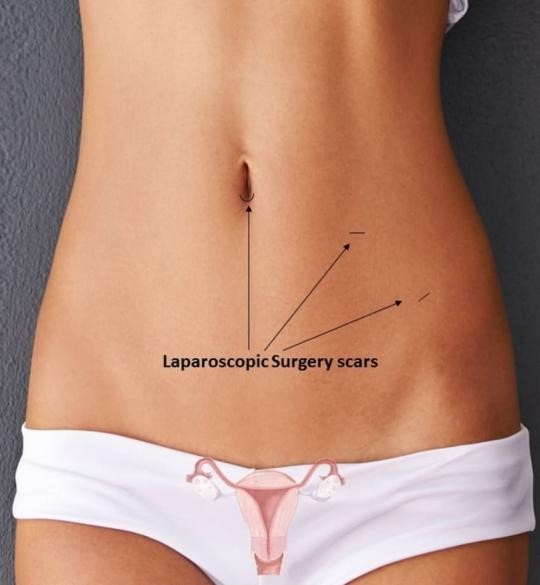
Generally, a small incision is made near the belly button and the abdomen is filled with a certain amount of carbon dioxide gas. This lifts the abdomen away from the internal organs, giving the surgeon a better view. The laparoscope, a special camera with its light source, is then inserted into the abdomen.
Two other small incisions may be made in the abdomen so additional surgical instruments, such as a probe to move organs, can be used during the surgery.
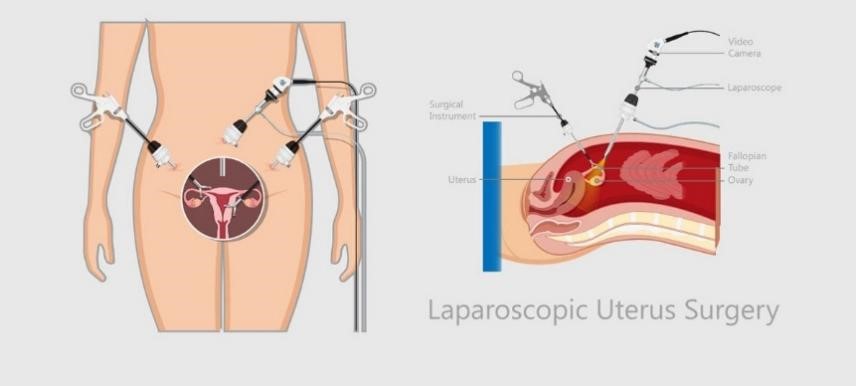
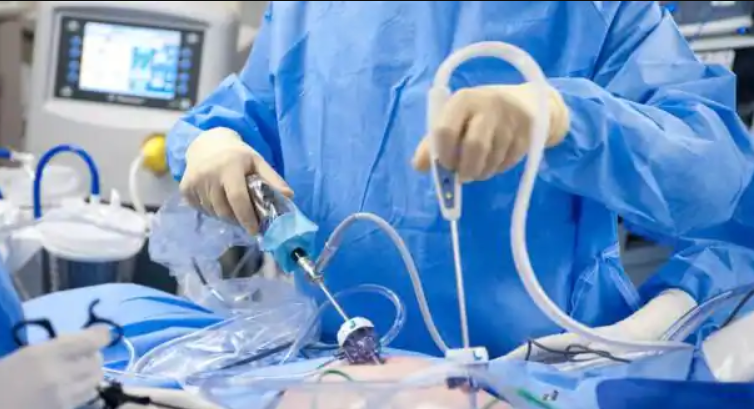
During the laparoscopy, the doctors see an enlarged image of the structures in the abdomen, through the laparoscope and its camera. They examine the pelvic organs and based on the findings they see, the planned surgery will be performed.
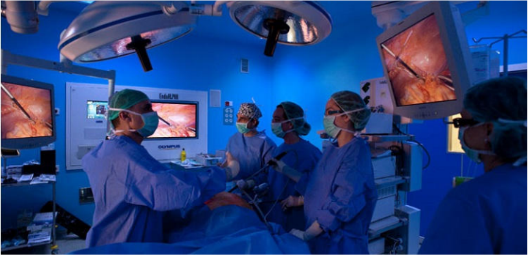
2) Why is laparoscopic surgery better than regular open surgery?
First and foremost, laparoscopy allows a patient to recover very quickly.
It surprises many to hear that the pain after surgeries is not so much from the internal organs which are operated, but rather from the sensitive skin and the structures on the body’s surface, that have to be cut through to reach the organs.
Smaller incisions mean that there is less pain and less chance of post-operative scarring.
Also, because internal organs are not exposed to the outside during the surgery, there’s less risk of acquiring infections.
Many people can be discharged on the same day after some operations.
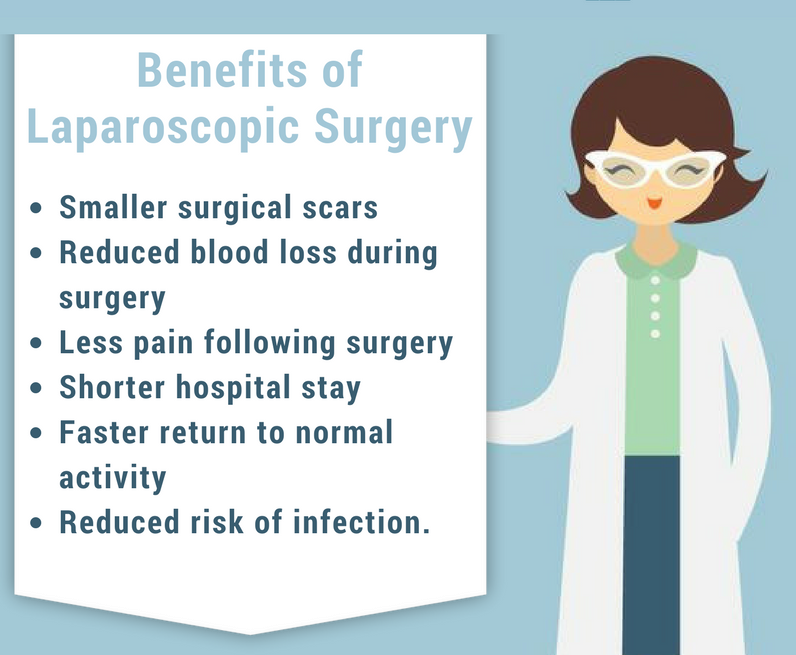
Once the surgery is decided on, you will be asked to meet the anesthesiologist
3) Why is it important to have an anesthesiology consultation before surgery?
Laparoscopic surgeries are usually performed under general anesthesia meaning the patient is kept in an unconscious state during the surgery. The role of the anesthetist is to assess whether you have any medical condition, and you are physically fit for the anesthesia part.

If you are on medications, for example, for diabetic or hypertension or any other condition, your doctor / anesthetic will give clear instructions when to take it based on the time of your scheduled surgery
If you’re taking blood-thinning medication (anticoagulants), such as aspirin or warfarin, you may be asked to stop taking it a few days beforehand. This is to prevent excessive bleeding during the operation.
4) How should I Prepare for a laparoscopic surgery?
There are certain things that need to be kept in mind before getting admitted for the surgery
1. Fasting for 6-12 hours– Depending on the type of laparoscopic procedure being performed, you’ll usually be asked not to eat or drink anything for 6 to 12 hours beforehand.
2. Do not wear jewelry– In laparoscopic surgery we may use a device called a diathermy to stop the bleeding. For the safe use of that machine, there shouldn’t be any close metal contact to the body parts.
3. Remove any nail polish, or artificial nails before surgery- Shave or clip the hair in the abdomen and bikini area – especially if you are going to have a pelvic or an abdominal surgery.
5. Carry low-heeled shoes the day of surgery– You might be a little drowsy after the anesthesia and unsteady on high heeled footwear.
6. Wear loose-fitting clothing– You will have some abdominal soreness and tenderness after surgery. So, it is always advisable to wear loose fitting clothes
7. Avoid smoking – If you smoke, you may be advised to stop during the lead-up to the operation. This is because smoking can delay healing after surgery and increase the risk of complications such as infection.
8. Arrange someone to drive you home – Most people can leave hospital either on the day of the procedure or the following day. Before the procedure, you’ll need to arrange for someone to drive you home because you’ll be advised not to drive for at least 24 or 48 hours afterwards.
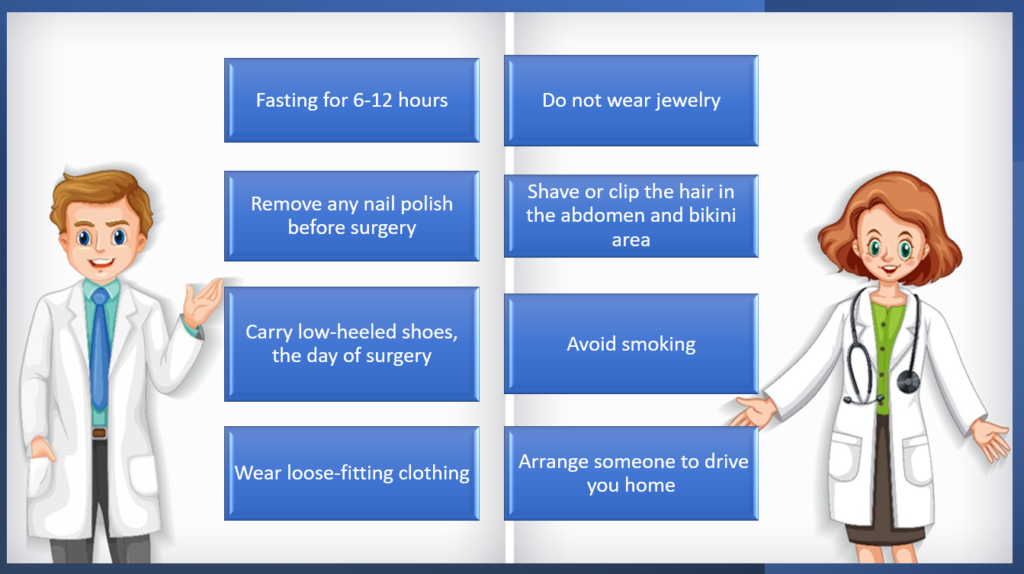
5) What You expect from the time of admission to the hospital to Discharge after the surgery?

In most of the hospitals you will be asked to come for admission on the same day of surgery preferably 3-4 hours prior to the scheduled surgery time.
After getting admitted, once you are comfortable in your room, the nurse will check your vitals, do the necessary preparation for the surgery which includes placing an IV cannula, administering medications and taking you to the preoperative room.

From preoperative room you will be shifted to operation theater for surgery. It is normal for many people to be anxious about the whole thing so they will be given a small dose of antianxiety medication.
Once the surgery is over, you will be observed in the post operative recovery room for around 30-45 minutes till you are totally stable and shifted back to your room, where you will be with your loved ones.
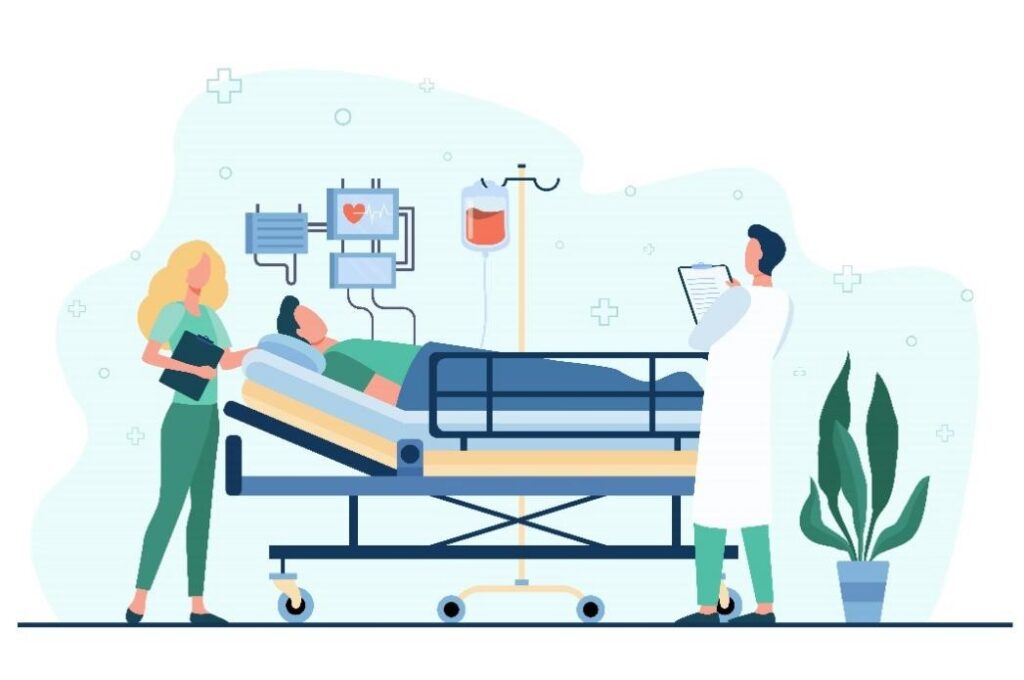
6) What can you expect after a laparoscopy surgery?
Immediately after the laparoscopy surgery, you may feel groggy and disorientated as you recover from the effects of the anesthesia medication. Some people feel sick or less commonly, vomit. Nurses and doctors will be checking you time to time and will be giving pain and other medications based on your condition.
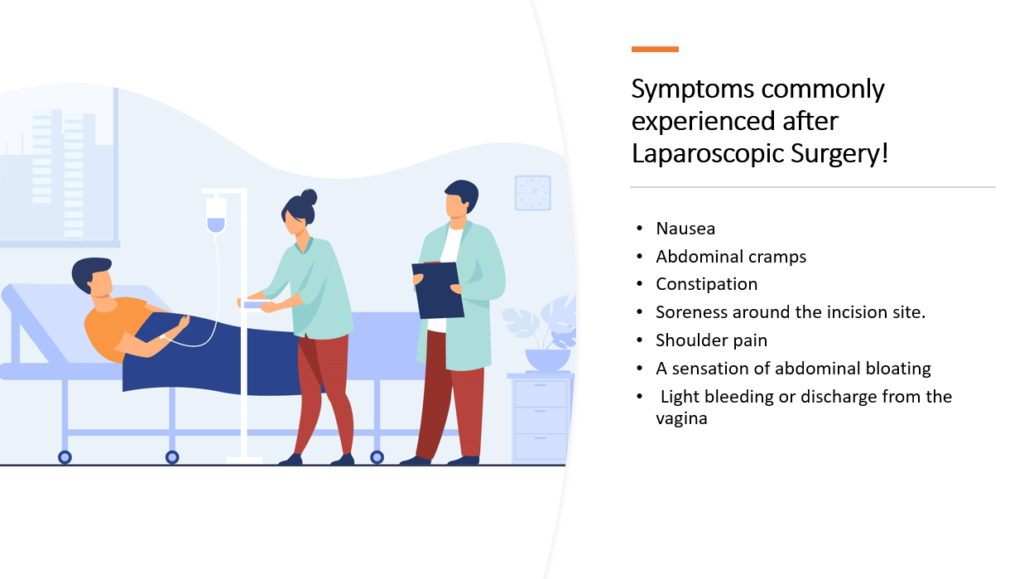
After the procedure, you can generally expect:
- Soreness around the incision site in your abdomen and pelvis.
- Shoulder pain, caused by the gas used into the abdominal cavity during the surgery.
- A sensation of abdominal bloating
- Nausea
- Abdominal cramps
- Constipation
- For pelvic procedures only, light bleeding or discharge from the vagina
7) How Many days, do I need to stay in the hospital?
Laparoscopic surgery is different for everyone. Each person can have different experience based on, the type of surgery, the length of surgery, the surgeon, the facility, how you respond to pain, and a variety of other factors.
On an average the stay in the hospital will be around 24-48 hours based on how well you are recovering and ready to get home

8) How much pain is normal after laparoscopy?
After surgery, it’s normal to have a sore belly, cramping, or pain around the cuts the doctor made (incisions) for up to 4 days. You can expect to feel better and stronger each day. But you might get tired quickly and need pain medicine for a few days.
9) How do I recover at home from a laparoscopy?
While you’re recovering at home after your laparoscopy, it’s good to keep a few things in mind. These tips include:
- Don’t drive for at least 48 hours after surgery.
- You can bathe any time after surgery.
- You can remove the bandage and the Steri-strips — which look like tape — can be removed two to three days after surgery.
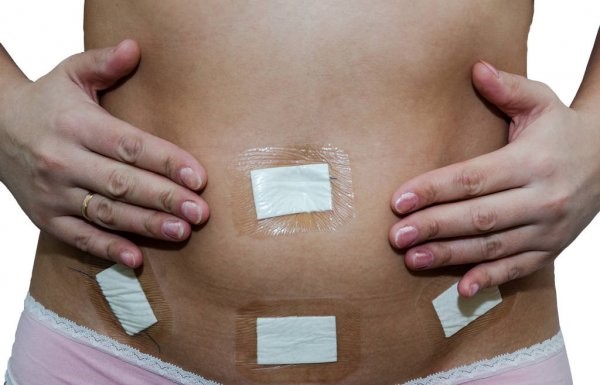
You can typically return to work three -14 days after surgery depending on the type of surgery you have undergone. If you need a doctor’s letter excusing you from work, please request one at your pre-operative appointment.
10) When should I come for a Follow-up after my surgery?
When you are getting discharged from the hospital you will be given a routine follow up appointment with your surgeon in 2 weeks time.
But You should notify your surgeon or gynecologist immediately or visit the emergency department if you develop any of the following symptoms after your laparoscopy .
- fever
- wound becomes painful, swollen, and red
- discharge appears from the wound
- severe abdominal pain or cramps
- frequent urination and scalding when passing urine
- vaginal discharge develops an unpleasant odour
- vomiting develops more than 24 hours after the operation
- tenderness and/or swelling in the calf muscles
- increasing soreness of the calf muscles when walking
- shortness of breath, chest pain or pain when breathing.
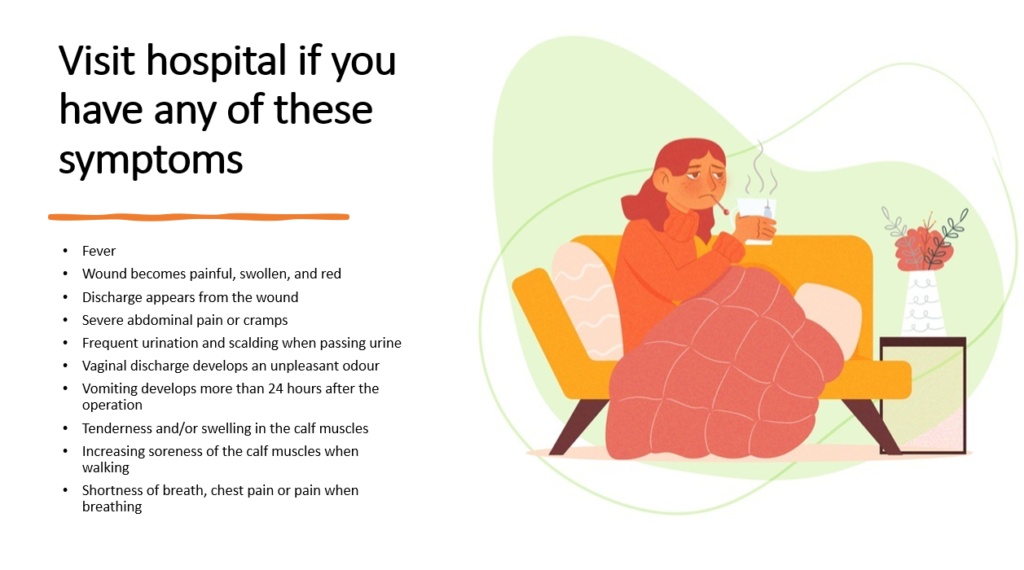
Now you know what to expect before and after your laparoscopic surgery. But it is also important to ask certain questions to your doctor before deciding for the surgery.
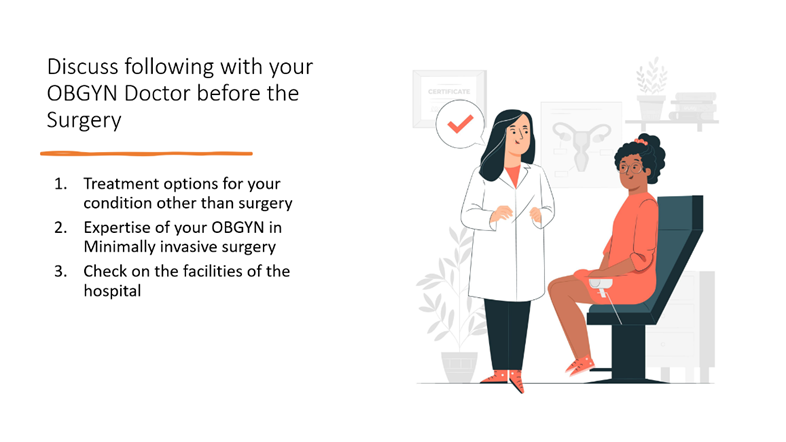
These are 3 things you should discuss with your doctor.
First and foremost, question, is whether surgery is the only option for your condition?
For most of the gynecological condition there are 3 options, wait and watch without any treatment, medical treatment and 3rd is surgical treatment. The type of treatment best for you is decided based on different factors like the symptoms, age of the patient and the fertility status and on doctors’ decision. If you are not happy with the treatment options suggested by one doctor there is no harm in getting a second or third opinion from an ob-gyn specialized in handling those conditions.
Does your Surgeon have enough experience in handling complex laparoscopic Surgeries?
It is important to know whether your Gynecological surgeon is having adequate training and extensive experience in laparoscopic surgery especially if you are undergoing surgeries for endometriosis, fibroid or any fertility enhancing surgeries. These surgeries should only be done by a Gynecological surgeon who is performing level 4 and above surgeries at a regular
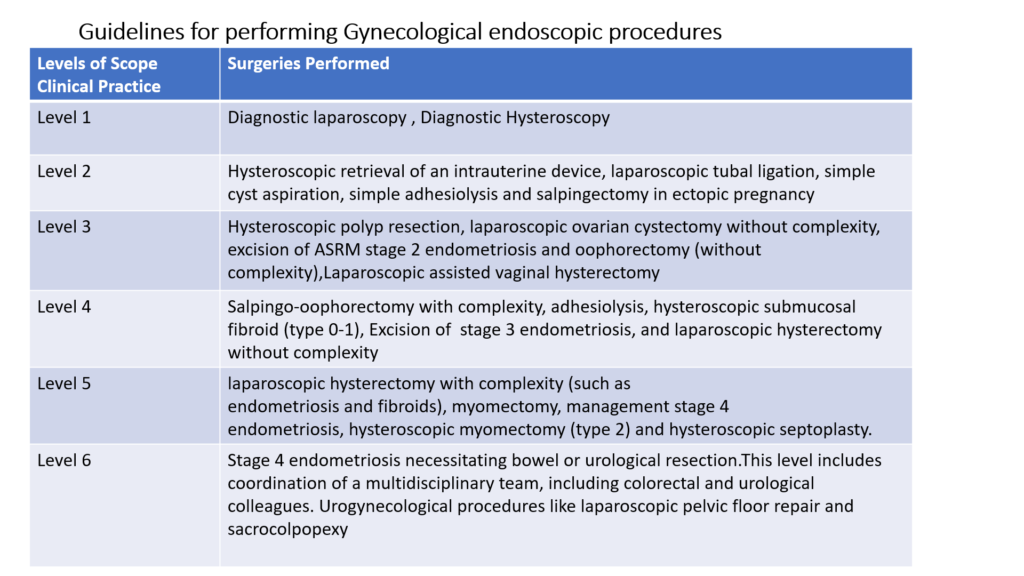
There is a saying in our medical practice that

Does the hospital have a well-equipped operation theater, multidisciplinary surgical team and other facilities like ICU, availability of blood and blood products?
It is very important to have all advanced surgical equipments and multidisciplinary surgical team for safe and successful treatment of complex cases.

Dr. Alphy S Puthiyidom
MBBS, MD(Obs&Gn),FMIS(Laparoscopy)
Head of the Department Obstetrics & Gynecology
Advanced Gynecological Laparoscopic Surgeon
& Pelvic Reconstructive Surgeon
MEDICLINIC WELCARE HOSPITAL
Al Garhoud, Dubai
MEDICLINIC PARKVIEW HOSPITAL
Umm Sequim, Al Barsha South 3, Dubai
Appointments 800-1999
